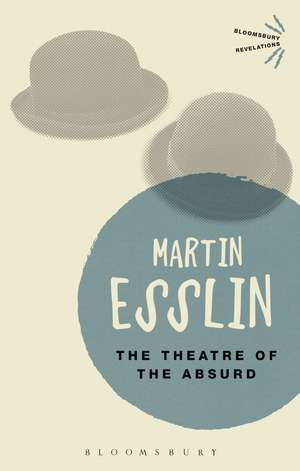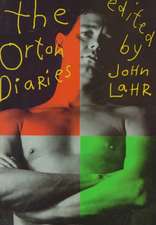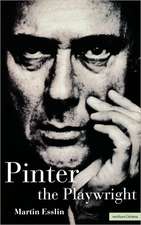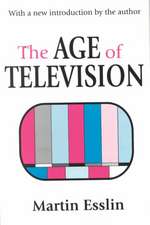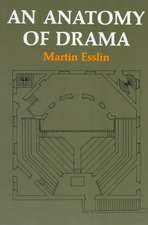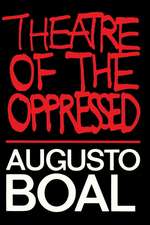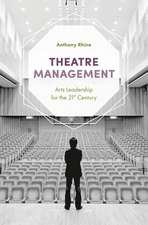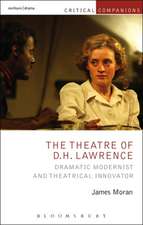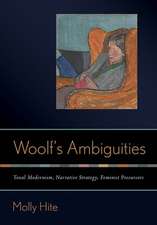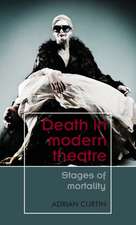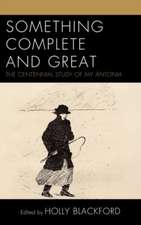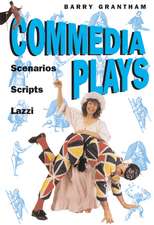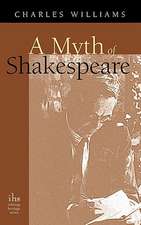The Theatre of the Absurd: Bloomsbury Revelations
Autor Martin Esslinen Limba Engleză Paperback – 22 oct 2014
| Toate formatele și edițiile | Preț | Express |
|---|---|---|
| Paperback (2) | 127.82 lei 3-5 săpt. | |
| Vintage Publishing – 31 dec 2003 | 127.82 lei 3-5 săpt. | |
| Bloomsbury Publishing – 22 oct 2014 | 169.91 lei 3-5 săpt. | +48.90 lei 7-13 zile |
Din seria Bloomsbury Revelations
-
 Preț: 125.75 lei
Preț: 125.75 lei - 13%
 Preț: 154.75 lei
Preț: 154.75 lei - 18%
 Preț: 177.18 lei
Preț: 177.18 lei - 19%
 Preț: 175.68 lei
Preț: 175.68 lei - 7%
 Preț: 109.19 lei
Preț: 109.19 lei - 14%
 Preț: 132.26 lei
Preț: 132.26 lei - 18%
 Preț: 180.74 lei
Preț: 180.74 lei - 14%
 Preț: 131.38 lei
Preț: 131.38 lei - 19%
 Preț: 175.85 lei
Preț: 175.85 lei - 7%
 Preț: 166.96 lei
Preț: 166.96 lei - 11%
 Preț: 183.45 lei
Preț: 183.45 lei - 14%
 Preț: 145.64 lei
Preț: 145.64 lei - 7%
 Preț: 163.86 lei
Preț: 163.86 lei - 15%
 Preț: 143.65 lei
Preț: 143.65 lei - 13%
 Preț: 156.03 lei
Preț: 156.03 lei - 19%
 Preț: 175.39 lei
Preț: 175.39 lei - 23%
 Preț: 133.61 lei
Preț: 133.61 lei - 18%
 Preț: 180.74 lei
Preț: 180.74 lei - 7%
 Preț: 155.79 lei
Preț: 155.79 lei - 9%
 Preț: 130.91 lei
Preț: 130.91 lei - 19%
 Preț: 175.39 lei
Preț: 175.39 lei - 22%
 Preț: 134.95 lei
Preț: 134.95 lei - 13%
 Preț: 174.07 lei
Preț: 174.07 lei - 18%
 Preț: 170.11 lei
Preț: 170.11 lei - 8%
 Preț: 191.36 lei
Preț: 191.36 lei - 24%
 Preț: 150.61 lei
Preț: 150.61 lei - 18%
 Preț: 177.79 lei
Preț: 177.79 lei - 13%
 Preț: 177.62 lei
Preț: 177.62 lei - 8%
 Preț: 159.61 lei
Preț: 159.61 lei - 13%
 Preț: 128.12 lei
Preț: 128.12 lei - 8%
 Preț: 160.87 lei
Preț: 160.87 lei - 12%
 Preț: 158.74 lei
Preț: 158.74 lei - 19%
 Preț: 144.12 lei
Preț: 144.12 lei - 19%
 Preț: 174.95 lei
Preț: 174.95 lei - 13%
 Preț: 155.87 lei
Preț: 155.87 lei - 19%
 Preț: 174.51 lei
Preț: 174.51 lei - 13%
 Preț: 170.80 lei
Preț: 170.80 lei - 18%
 Preț: 180.27 lei
Preț: 180.27 lei - 8%
 Preț: 145.57 lei
Preț: 145.57 lei - 18%
 Preț: 177.18 lei
Preț: 177.18 lei -
 Preț: 174.91 lei
Preț: 174.91 lei - 12%
 Preț: 160.73 lei
Preț: 160.73 lei - 7%
 Preț: 108.51 lei
Preț: 108.51 lei - 18%
 Preț: 173.48 lei
Preț: 173.48 lei - 23%
 Preț: 133.15 lei
Preț: 133.15 lei - 12%
 Preț: 171.56 lei
Preț: 171.56 lei -
 Preț: 152.57 lei
Preț: 152.57 lei - 13%
 Preț: 136.99 lei
Preț: 136.99 lei - 7%
 Preț: 108.72 lei
Preț: 108.72 lei
Preț: 169.91 lei
Preț vechi: 194.90 lei
-13% Nou
Puncte Express: 255
Preț estimativ în valută:
32.52€ • 33.82$ • 27.21£
32.52€ • 33.82$ • 27.21£
Carte disponibilă
Livrare economică 22 februarie-08 martie
Livrare express 08-14 februarie pentru 58.89 lei
Preluare comenzi: 021 569.72.76
Specificații
ISBN-13: 9781472577023
ISBN-10: 1472577027
Pagini: 432
Dimensiuni: 138 x 216 x 25 mm
Greutate: 0.54 kg
Editura: Bloomsbury Publishing
Colecția Bloomsbury Academic
Seria Bloomsbury Revelations
Locul publicării:London, United Kingdom
ISBN-10: 1472577027
Pagini: 432
Dimensiuni: 138 x 216 x 25 mm
Greutate: 0.54 kg
Editura: Bloomsbury Publishing
Colecția Bloomsbury Academic
Seria Bloomsbury Revelations
Locul publicării:London, United Kingdom
Caracteristici
Martin Esslin's landmark exploration of 20th century European avant-garde theatre
Notă biografică
Martin Esslin OBE (1918-2002) was a prolific dramatist, producer and translator, as well as being one of the most perceptive theatre critics of the 20th century.
Cuprins
AcknowledgementsForeword Forty Years OnIntroduction: The Absurdity of the Absurd1. Samuel Beckett: The Search for the Self2. Arthur Adamov: The Curable and the Incurable3. Eugene Ionesco: Theatre and Anti-Theatre4. Jean Genet: A Hall of Mirrors5. Harold Pinter: Certainties and Uncertainties6. Parallels and Proselytes7. The Tradition of the Absurd8. The Significance of the Absurd9. Beyond the AbsurdBibliography 1: The Dramatists of the AbsurdBibliography 2: Background and History of the Theatre of the AbsurdIndex
Extras
I
SAMUEL BECKETT
The search for the self
In his last will and testament, Murphy, the hero of Samuel Beckett's early novel of that name, enjoins his heirs and executors to place his ashes in a paper bag and take them to 'the Abbey Theatre, Lr Abbey Street, Dublin ... into what the great and good Lord Chesterfield calls the necessary house, where their happiest hours have been spent, on the right as one goes down into the pit . . . and that the chain be there pulled upon them, if possible during the performance of a piece.'1 This is a symbolic act in the true irreverent spirit of the anti-theatre, but one that also reveals where the author of Waiting for Godot received his first impressions of the type of drama against which he reacted in his rejection of what he has called 'the grotesque fallacy of realistic art--"that miserable statement of line and surface" and the penny-a-line vulgarity of a literature of notations'.2
Samuel Beckett was born in Dublin in 1906, the son of a quantity surveyor. Like Shaw, Wilde, and Yeats, he came from the Protestant Irish middle class and was, though he later lost his faith, brought up 'almost a Quaker', as he himself once put it.3 It has been suggested that Beckett's preoccupation with the problem of being and the identity of the self might have sprung from the Anglo-Irishman's inevitable and perpetual concern with finding his own answer to the question 'Who am I?', but while there may well be a grain of truth in this, it is surely far from providing a complete explanation for the deep existential anguish that is the keynote of Beckett's work and that clearly originates in levels of his personality far deeper than its social surface.
1. Samuel Beckett, Murphy (New York: Grove Press, no date), p. 269.
2. Beckett, Proust (New York: Grove Press, no date). p. 57.
3. Beckett, quoted by Harold Hobson, 'Samuel Beckett, dramatist of the year', International Theatre Annual, no. 1 (London: John Calder, 1956).
At the age of fourteen, Beckett was sent to one of the Anglo-Irishman's traditional boarding schools, Portora Royal School, at Enniskillen, County Fermanagh, founded by King James I, where Oscar Wilde had also been a pupil. It is characteristic of Beckett that he, whose writing reveals him as one of the most tormented and sensitive of human beings, not only became a popular and brilliant scholar but also excelled at games, batting left-handed and bowling right at cricket, and playing scrum--half at rugger.
In 1923, Beckett left Portora and entered Trinity College, Dublin, where he read French and Italian, receiving his Bachelor of Arts degree in 1927. Such was his academic distinction that he was nominated by his university as its representative in a traditional exchange of lecturers with the famous Ecole Normale Superieure, in Paris. Accordingly, after a brief spell of teaching in Belfast, he went to Paris for a two-year stint as a lecteur d'anglais at the Ecole Nomiale in the autumn of 1928.
Thus began his lifelong association with Paris. In Paris he met James Joyce and soon became a member of his circle, contributing, at the age of twenty-three, the brilliant opening essay of that strange book entitled Our Exagmination round his Factification for Incamination of Work in Progress, a collection of twelve articles by twelve apostles, as a defence and exegesis of their master's as yet unnamed magnum opus. Beckett's contribution, headed 'Dante . . . Bruno. Vico . . . Joyce', culminates in a spirited assertion of the artist's duty to express the totality and complexity of his experience regardless of the public's lazy demand for easy comprehensibility:
Here is direct expression--pages and pages of it. And if you don't understand it, Ladies and Gentlemen, it is because you are too decadent to receive it. You are not satisfied unless form is so strictly divorced from content that you can comprehend the one almost without bothering to read the other. This rapid skimming and absorption of the scant cream of sense is made possible by what I may call a continuous process of copious intellectual salivation. The form that is an arbitrary and independent phenomenon can fulfil no higher function than that of stimulus for a tertiary or quartary conditioned reflex of dribbling comprehension.1
These are the articles of his faith that Beckett has put into practice in his own life's work as a writer, with an uncompromising consistency almost terrifying in its purity.
In a letter to Harriet Shaw Weaver dated 28 May 1929,2 Joyce speaks of his intention of having Beckett's essay published in an Italian review. In the same letter he mentions a country picnic planned by Adrienne Monnier to celebrate the twenty-fifth anniversary of Bloomsday. This was the 'Déjeuner Ulysse' held on 27 June 1929, at the Hôtel Léopold at Les Vaux de-Cernay, near Versailles. From Richard Elman's biography of Joyce, we learn that Beckett was one of the guests, who included Paul Valéry, Jules Romains, Léon-Paul Fargue, Philippe Soupault, and many other distinguished names, and that on the return journey Beckett aroused the wrath of Paul Valéry and Adrienne Monnier by repeatedly prevailing upon Joyce to have the bus stopped so that they might have yet another drink at some wayside café.
During his first stay in Paris, Beckett also made his mark as a poet by winning a literary prize--ten pounds, for the best poem on the subject of time--in a competition inspired by Nancy Cunard and judged by her and Richard Aldington. Beckett's poem, provocatively entitled 'Whoroscope', presents the philosopher Descartes meditating on time, hens' eggs, and evanescence. The little booklet, published in Paris by the Hours Press in an edition of a hundred signed copies at five shillings, and two hundred unsigned ones at a shilling, has become a collector's piece, with the little slip pasted on it that informs the reader of the award of the prize and that this is 'Mr Samuel Beckett's first separately published work'.
1. Beckett, 'Dante ... Bruno. Vico . . . Joyce', in Our Exagmination round his Factification for Incamination of Work in Progress (Paris: Shakespeare & Co., 1929), p. 13.
2. Letters of James Joyce, ed. Stuart Gilbert (London: Faber & Faber, 1957), pp. 280-81.
For his newly found friend James Joyce, Beckett also embarked on a daring attempt at rendering the 'Anna Livia Plurabelle' passage from Work in Progress into French. But this undertaking, in which he was assisted by Alfred Peron, had to be abandoned (and was carried to completion by Joyce, Soupault, and a number of others) in the course of 1930, when Beckett returned to Dublin to take the post of assistant to the professor of Romance languages at Trinity College.
Thus, at the age of twenty-four, Beckett seemed to be launched on a safe and brilliant academic and literary career. He obtained his Master of Arts degree. His study of Proust, commissioned by a London publisher and written while he was still in Paris, appeared in 1931. It is a penetrating interpretation of Proust's work as an exploration of time, but it also foreshadows many of Beckett's themes in the works he was still to write--the impossibility of possession in love, and the illusion of friendship: '. . . if love . . . is a function of man's sadness, friendship is a function of his cowardice; and if neither can be realized because of the impenetrability (isolation) of all that is not "cosa mentale", at least the failure to possess may have the nobility of that which is tragic, whereas the attempt to communicate where no communication is possible is merely a simian vulgarity, or horribly comic, like the madness that holds a conversation with the furniture.'1 1.Proust, p. 46.
For an artist therefore, 'the only possible spiritual development is in the sense of depth. The artistic tendency is not expansive, but a contraction. And art is the apotheosis of solitude. There is no communication because there are no vehicles of communication."1 Although these ideas are expositions of Proust's thought, and although today he stresses that he wrote the little book on order, not out of any deep affinity with Proust, Beckett clearly put many of his personal feelings and views into it.
To one who felt that habit and routine was the cancer of time, social intercourse a mere illusion, and the artist's life of necessity a life of solitude, the daily grind of a university lecturer's work must have appeared unbearable. After only four terms at Trinity College, he had had enough. He threw up his career and cut himself loose from all routine and social duties. Like Belacqua, the hero of his volume of short stories More Pricks than Kicks, who, though indolent by nature, 'enlivened the last phase of his solipsism . . . with the belief that the best thing he had to do was to move constantly from place to place',2 Beckett embarked on a period of Wanderjahre. Writing poems and stories, doing odd jobs, he moved from Dublin to London to Paris, travelled through France and Germany. It is surely no coincidence that so many of Beckett's later characters are tramps and wanderers, and that all are lonely.
More Pricks than Kicks is set in Dublin; the next volume, a slim collection of poems, Echo's Bones and Other Precipitates (1935), widens its references to landmarks from Dublin (Guinness's barges by O'Connell Bridge) to Paris (the American Bar in the Rue Mouffetard) and London (the 'grand old British Museum', Ken Wood, and Tower Bridge). Beckett's stay in London also left its mark on his first novel, Murphy (1938): the 'World's End' on the fringes of Chelsea; the area around the Caledonian market and Pentonville; Gower Street.
1. ibid., p. 47.
2.Beckett, More Pricks than Kicks (London: Chatto & Windus, 1934), p. 43.
Whenever he passed through Paris, Beckett went to see Joyce. In Richard Ellmann's words,
Beckett was addicted to silences, and so was Joyce; they engaged in conversations which consisted often in silences directed towards each other, both suffused with sadness, Beckett mostly for the world, Joyce mostly for himself. Joyce sat in his habitual posture, legs crossed, toe of the upper leg under the instep of the lower; Beckett, also tall and slender, fell into the same gesture. Joyce suddenly asked some such question as 'How could the idealist Hume write a history?' Beckett replied, 'A history of representations.'1
Beckett read Joyce passages from the works of Fritz Mauthner, whose Critique of Language was one of the first works to point to the fallibility of language as a medium for the discovery and communication of metaphysical truths. But 'though he liked having Beckett with him, Joyce at the same time kept him at a distance. Once he said directly: "I don't love anyone except my family" in a tone which suggested, "I don't like anyone except my family either." '2 Once or twice Joyce, whose sight had long been failing, dictated passages from Finnegans Wake to Beckett. This may be the origin of the oft-repeated assertion that Beckett was at one time Joyce's private secretary. He never held such a position. If anyone ever acted as Joyce's secretary it was Paul Leon.
Richard Ellmann also tells the story of the infatuation of Joyce's unhappy daughter, Lucia, for Beckett. Beckett sometimes took Lucia, already high-strung and neurotic, to restaurants and theatres. 'As her self-control began to leave her, she made less effort to conceal the passion she felt for him, and at last her feelings became so overt that Beckett told her bluntly he came to the Joyce flat primarily to see her father. He felt he had been cruel and later told Peggy Guggenheim that he was dead and had no feelings that were human; hence he had not been able to fall in love with Lucia.'3
1. Richard Ellmann, James Joyce (New York and London: Oxford University Press, 1959), p. 661.
2. ibid.
3. ibid., p. 662.
Peggy Guggenheim, patron of the arts and a famous collector of modern paintings, was herself, as she reports in her memoirs, 'terribly in love' with Beckett a few years later. She describes him as a fascinating young man, but afflicted with an apathy that sometimes kept him in bed till mid-afternoon; with whom it was difficult to converse, as 'he was never very animated and it took hours and lots of drink to warm him up before he finally unravelled himself.'1 Like Belacqua, who sometimes wanted 'to be back in the caul on my back in the dark forever',2 Beckett, according to Peggy Guggenheim, 'had retained a terrible memory of life in his mother's womb. He was constantly suffering from this and had awful crises, when he felt he was suffocating. He always said our life would be all right one day, but if I ever pressed him to make a decision it was fatal and he took back everything he had previously said.'3
Murphy, published in 1938 with the help and support of Herbert Read, is to some extent concerned with an analogous situation between the hero and his girl-friend Celia, who vainly tries to make him take up regular employment so they can get married, but has to see him elude her again and again.
Beckett's first play, Eleutheria (written in French shortly after the war, but so far unpublished and unperformed), is also concerned with a young man's efforts to cut himself loose from his family and social obligations. Eleutheria is in three acts. The stage is divided in the middle. On the right the hero lies in his bed, apathetic and passive. On the left his family and friends discuss his case without ever directly addressing him. Gradually, the action shifts from left to right, and eventually the hero summons up the energy to free himself from his shackles and cut himself loose from society.
1. Peggy Guggenheim, Confessions of an Art Addict (London: Andre Deutsch, 1960), p. 50.
2. More Pricks than Kicks, p. 32.
3. Peggy Guggenheim, op. cit., p. 50.
Murphy and Eleutheria mirror Beckett's search for freedom and the right to live his own life. In fact he found himself a permanent home: in Paris. In 1937 he acquired his apartment on the top floor of a block of flats in outer Montparnasse, which was to become his base throughout the war and post-war years.
About this time an episode occurred that might have come straight out of Beckett's own writings: he was stabbed in a Paris street by an underworld character who had accosted him for money, and had to be taken to a hospital with a perforated lung. Later, when his wound had healed, Beckett went to see his assailant in prison. He asked the apache why he had stabbed him, and received the answer, 'Je ne sais pas, Monsieur.' It might well be the voice of this man that we hear in Waiting for Godot and Molloy.
When war came, in September 1939, Beckett was in Ireland, visiting his widowed mother. He immediately returned to Paris. He had long been a decided opponent of the National Socialist regime in Germany, appalled by its brutality and anti-Semitism. Now that war had broken out, he argued with Joyce, who regarded the war as useless and futile. Beckett firmly maintained that its objectives were indeed justified. Being a citizen of Eire, and thus a neutral, he was able to stay in Paris even after the city had been occupied by the Germans. He joined a Resistance group, and led the dangerous and precarious life of a member of the underground movement.
SAMUEL BECKETT
The search for the self
In his last will and testament, Murphy, the hero of Samuel Beckett's early novel of that name, enjoins his heirs and executors to place his ashes in a paper bag and take them to 'the Abbey Theatre, Lr Abbey Street, Dublin ... into what the great and good Lord Chesterfield calls the necessary house, where their happiest hours have been spent, on the right as one goes down into the pit . . . and that the chain be there pulled upon them, if possible during the performance of a piece.'1 This is a symbolic act in the true irreverent spirit of the anti-theatre, but one that also reveals where the author of Waiting for Godot received his first impressions of the type of drama against which he reacted in his rejection of what he has called 'the grotesque fallacy of realistic art--"that miserable statement of line and surface" and the penny-a-line vulgarity of a literature of notations'.2
Samuel Beckett was born in Dublin in 1906, the son of a quantity surveyor. Like Shaw, Wilde, and Yeats, he came from the Protestant Irish middle class and was, though he later lost his faith, brought up 'almost a Quaker', as he himself once put it.3 It has been suggested that Beckett's preoccupation with the problem of being and the identity of the self might have sprung from the Anglo-Irishman's inevitable and perpetual concern with finding his own answer to the question 'Who am I?', but while there may well be a grain of truth in this, it is surely far from providing a complete explanation for the deep existential anguish that is the keynote of Beckett's work and that clearly originates in levels of his personality far deeper than its social surface.
1. Samuel Beckett, Murphy (New York: Grove Press, no date), p. 269.
2. Beckett, Proust (New York: Grove Press, no date). p. 57.
3. Beckett, quoted by Harold Hobson, 'Samuel Beckett, dramatist of the year', International Theatre Annual, no. 1 (London: John Calder, 1956).
At the age of fourteen, Beckett was sent to one of the Anglo-Irishman's traditional boarding schools, Portora Royal School, at Enniskillen, County Fermanagh, founded by King James I, where Oscar Wilde had also been a pupil. It is characteristic of Beckett that he, whose writing reveals him as one of the most tormented and sensitive of human beings, not only became a popular and brilliant scholar but also excelled at games, batting left-handed and bowling right at cricket, and playing scrum--half at rugger.
In 1923, Beckett left Portora and entered Trinity College, Dublin, where he read French and Italian, receiving his Bachelor of Arts degree in 1927. Such was his academic distinction that he was nominated by his university as its representative in a traditional exchange of lecturers with the famous Ecole Normale Superieure, in Paris. Accordingly, after a brief spell of teaching in Belfast, he went to Paris for a two-year stint as a lecteur d'anglais at the Ecole Nomiale in the autumn of 1928.
Thus began his lifelong association with Paris. In Paris he met James Joyce and soon became a member of his circle, contributing, at the age of twenty-three, the brilliant opening essay of that strange book entitled Our Exagmination round his Factification for Incamination of Work in Progress, a collection of twelve articles by twelve apostles, as a defence and exegesis of their master's as yet unnamed magnum opus. Beckett's contribution, headed 'Dante . . . Bruno. Vico . . . Joyce', culminates in a spirited assertion of the artist's duty to express the totality and complexity of his experience regardless of the public's lazy demand for easy comprehensibility:
Here is direct expression--pages and pages of it. And if you don't understand it, Ladies and Gentlemen, it is because you are too decadent to receive it. You are not satisfied unless form is so strictly divorced from content that you can comprehend the one almost without bothering to read the other. This rapid skimming and absorption of the scant cream of sense is made possible by what I may call a continuous process of copious intellectual salivation. The form that is an arbitrary and independent phenomenon can fulfil no higher function than that of stimulus for a tertiary or quartary conditioned reflex of dribbling comprehension.1
These are the articles of his faith that Beckett has put into practice in his own life's work as a writer, with an uncompromising consistency almost terrifying in its purity.
In a letter to Harriet Shaw Weaver dated 28 May 1929,2 Joyce speaks of his intention of having Beckett's essay published in an Italian review. In the same letter he mentions a country picnic planned by Adrienne Monnier to celebrate the twenty-fifth anniversary of Bloomsday. This was the 'Déjeuner Ulysse' held on 27 June 1929, at the Hôtel Léopold at Les Vaux de-Cernay, near Versailles. From Richard Elman's biography of Joyce, we learn that Beckett was one of the guests, who included Paul Valéry, Jules Romains, Léon-Paul Fargue, Philippe Soupault, and many other distinguished names, and that on the return journey Beckett aroused the wrath of Paul Valéry and Adrienne Monnier by repeatedly prevailing upon Joyce to have the bus stopped so that they might have yet another drink at some wayside café.
During his first stay in Paris, Beckett also made his mark as a poet by winning a literary prize--ten pounds, for the best poem on the subject of time--in a competition inspired by Nancy Cunard and judged by her and Richard Aldington. Beckett's poem, provocatively entitled 'Whoroscope', presents the philosopher Descartes meditating on time, hens' eggs, and evanescence. The little booklet, published in Paris by the Hours Press in an edition of a hundred signed copies at five shillings, and two hundred unsigned ones at a shilling, has become a collector's piece, with the little slip pasted on it that informs the reader of the award of the prize and that this is 'Mr Samuel Beckett's first separately published work'.
1. Beckett, 'Dante ... Bruno. Vico . . . Joyce', in Our Exagmination round his Factification for Incamination of Work in Progress (Paris: Shakespeare & Co., 1929), p. 13.
2. Letters of James Joyce, ed. Stuart Gilbert (London: Faber & Faber, 1957), pp. 280-81.
For his newly found friend James Joyce, Beckett also embarked on a daring attempt at rendering the 'Anna Livia Plurabelle' passage from Work in Progress into French. But this undertaking, in which he was assisted by Alfred Peron, had to be abandoned (and was carried to completion by Joyce, Soupault, and a number of others) in the course of 1930, when Beckett returned to Dublin to take the post of assistant to the professor of Romance languages at Trinity College.
Thus, at the age of twenty-four, Beckett seemed to be launched on a safe and brilliant academic and literary career. He obtained his Master of Arts degree. His study of Proust, commissioned by a London publisher and written while he was still in Paris, appeared in 1931. It is a penetrating interpretation of Proust's work as an exploration of time, but it also foreshadows many of Beckett's themes in the works he was still to write--the impossibility of possession in love, and the illusion of friendship: '. . . if love . . . is a function of man's sadness, friendship is a function of his cowardice; and if neither can be realized because of the impenetrability (isolation) of all that is not "cosa mentale", at least the failure to possess may have the nobility of that which is tragic, whereas the attempt to communicate where no communication is possible is merely a simian vulgarity, or horribly comic, like the madness that holds a conversation with the furniture.'1 1.Proust, p. 46.
For an artist therefore, 'the only possible spiritual development is in the sense of depth. The artistic tendency is not expansive, but a contraction. And art is the apotheosis of solitude. There is no communication because there are no vehicles of communication."1 Although these ideas are expositions of Proust's thought, and although today he stresses that he wrote the little book on order, not out of any deep affinity with Proust, Beckett clearly put many of his personal feelings and views into it.
To one who felt that habit and routine was the cancer of time, social intercourse a mere illusion, and the artist's life of necessity a life of solitude, the daily grind of a university lecturer's work must have appeared unbearable. After only four terms at Trinity College, he had had enough. He threw up his career and cut himself loose from all routine and social duties. Like Belacqua, the hero of his volume of short stories More Pricks than Kicks, who, though indolent by nature, 'enlivened the last phase of his solipsism . . . with the belief that the best thing he had to do was to move constantly from place to place',2 Beckett embarked on a period of Wanderjahre. Writing poems and stories, doing odd jobs, he moved from Dublin to London to Paris, travelled through France and Germany. It is surely no coincidence that so many of Beckett's later characters are tramps and wanderers, and that all are lonely.
More Pricks than Kicks is set in Dublin; the next volume, a slim collection of poems, Echo's Bones and Other Precipitates (1935), widens its references to landmarks from Dublin (Guinness's barges by O'Connell Bridge) to Paris (the American Bar in the Rue Mouffetard) and London (the 'grand old British Museum', Ken Wood, and Tower Bridge). Beckett's stay in London also left its mark on his first novel, Murphy (1938): the 'World's End' on the fringes of Chelsea; the area around the Caledonian market and Pentonville; Gower Street.
1. ibid., p. 47.
2.Beckett, More Pricks than Kicks (London: Chatto & Windus, 1934), p. 43.
Whenever he passed through Paris, Beckett went to see Joyce. In Richard Ellmann's words,
Beckett was addicted to silences, and so was Joyce; they engaged in conversations which consisted often in silences directed towards each other, both suffused with sadness, Beckett mostly for the world, Joyce mostly for himself. Joyce sat in his habitual posture, legs crossed, toe of the upper leg under the instep of the lower; Beckett, also tall and slender, fell into the same gesture. Joyce suddenly asked some such question as 'How could the idealist Hume write a history?' Beckett replied, 'A history of representations.'1
Beckett read Joyce passages from the works of Fritz Mauthner, whose Critique of Language was one of the first works to point to the fallibility of language as a medium for the discovery and communication of metaphysical truths. But 'though he liked having Beckett with him, Joyce at the same time kept him at a distance. Once he said directly: "I don't love anyone except my family" in a tone which suggested, "I don't like anyone except my family either." '2 Once or twice Joyce, whose sight had long been failing, dictated passages from Finnegans Wake to Beckett. This may be the origin of the oft-repeated assertion that Beckett was at one time Joyce's private secretary. He never held such a position. If anyone ever acted as Joyce's secretary it was Paul Leon.
Richard Ellmann also tells the story of the infatuation of Joyce's unhappy daughter, Lucia, for Beckett. Beckett sometimes took Lucia, already high-strung and neurotic, to restaurants and theatres. 'As her self-control began to leave her, she made less effort to conceal the passion she felt for him, and at last her feelings became so overt that Beckett told her bluntly he came to the Joyce flat primarily to see her father. He felt he had been cruel and later told Peggy Guggenheim that he was dead and had no feelings that were human; hence he had not been able to fall in love with Lucia.'3
1. Richard Ellmann, James Joyce (New York and London: Oxford University Press, 1959), p. 661.
2. ibid.
3. ibid., p. 662.
Peggy Guggenheim, patron of the arts and a famous collector of modern paintings, was herself, as she reports in her memoirs, 'terribly in love' with Beckett a few years later. She describes him as a fascinating young man, but afflicted with an apathy that sometimes kept him in bed till mid-afternoon; with whom it was difficult to converse, as 'he was never very animated and it took hours and lots of drink to warm him up before he finally unravelled himself.'1 Like Belacqua, who sometimes wanted 'to be back in the caul on my back in the dark forever',2 Beckett, according to Peggy Guggenheim, 'had retained a terrible memory of life in his mother's womb. He was constantly suffering from this and had awful crises, when he felt he was suffocating. He always said our life would be all right one day, but if I ever pressed him to make a decision it was fatal and he took back everything he had previously said.'3
Murphy, published in 1938 with the help and support of Herbert Read, is to some extent concerned with an analogous situation between the hero and his girl-friend Celia, who vainly tries to make him take up regular employment so they can get married, but has to see him elude her again and again.
Beckett's first play, Eleutheria (written in French shortly after the war, but so far unpublished and unperformed), is also concerned with a young man's efforts to cut himself loose from his family and social obligations. Eleutheria is in three acts. The stage is divided in the middle. On the right the hero lies in his bed, apathetic and passive. On the left his family and friends discuss his case without ever directly addressing him. Gradually, the action shifts from left to right, and eventually the hero summons up the energy to free himself from his shackles and cut himself loose from society.
1. Peggy Guggenheim, Confessions of an Art Addict (London: Andre Deutsch, 1960), p. 50.
2. More Pricks than Kicks, p. 32.
3. Peggy Guggenheim, op. cit., p. 50.
Murphy and Eleutheria mirror Beckett's search for freedom and the right to live his own life. In fact he found himself a permanent home: in Paris. In 1937 he acquired his apartment on the top floor of a block of flats in outer Montparnasse, which was to become his base throughout the war and post-war years.
About this time an episode occurred that might have come straight out of Beckett's own writings: he was stabbed in a Paris street by an underworld character who had accosted him for money, and had to be taken to a hospital with a perforated lung. Later, when his wound had healed, Beckett went to see his assailant in prison. He asked the apache why he had stabbed him, and received the answer, 'Je ne sais pas, Monsieur.' It might well be the voice of this man that we hear in Waiting for Godot and Molloy.
When war came, in September 1939, Beckett was in Ireland, visiting his widowed mother. He immediately returned to Paris. He had long been a decided opponent of the National Socialist regime in Germany, appalled by its brutality and anti-Semitism. Now that war had broken out, he argued with Joyce, who regarded the war as useless and futile. Beckett firmly maintained that its objectives were indeed justified. Being a citizen of Eire, and thus a neutral, he was able to stay in Paris even after the city had been occupied by the Germans. He joined a Resistance group, and led the dangerous and precarious life of a member of the underground movement.
Recenzii
“Exciting and stimulating...a very useful reference work and a standard text book.” —Literary Review
